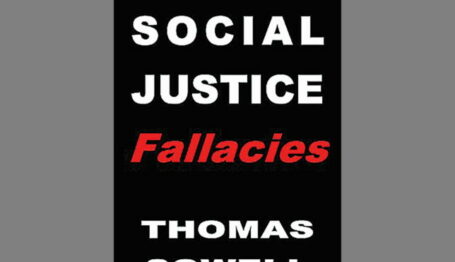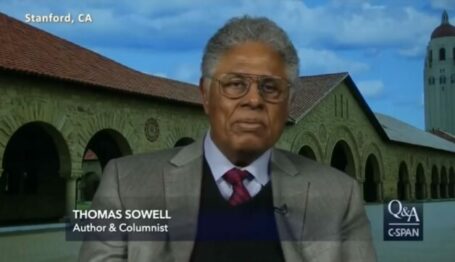Organization Trends
The Anti-American Left: Communophilism
 To Joshua Muravchik, “communophiles” could be distinguished by their virulent criticism of capitalist democracies like the United States, which they considered so flawed that they needed radical transformation, rather than mere reformation. Credit: Jmuravchik. License: https://bit.ly/3HHc8Rh.
To Joshua Muravchik, “communophiles” could be distinguished by their virulent criticism of capitalist democracies like the United States, which they considered so flawed that they needed radical transformation, rather than mere reformation. Credit: Jmuravchik. License: https://bit.ly/3HHc8Rh.

The Anti-American Left (full series)
Communophilism | IPS and the National Lawyers Guild
Democratic Socialists of America | Alliance for Global Justice
The War on Terror and Code Pink | Russian Invasion of Ukraine
Summary: The United States of America has arguably been the single most indispensable force for global good over at least the past century. Yet a distinct and longstanding vein of activism on the American Left—the anti-American Left—argues that American influence is harmful and deleterious to the well-being of the rest of the world. The anti-American Left’s fault lies not in its criticism of any given aspect of American foreign or domestic policy—on the contrary, criticism can sometimes be productive. The real harm is in its incessant and dishonest portrayal of the United States as some uniquely malevolent global influence, while brushing aside the brutality of some of the world’s true bad actors and ignoring America’s unparalleled (if imperfect) record of confronting them. What’s more, in many cases the anti-American Left receives substantial funding from mainstream philanthropy—wealthy individuals and foundations that have benefited tremendously from the peace and prosperity engendered by American military power and the global spread of democratic capitalism.
Communophilism
The conclusion that the United States of America has functioned as the single most indispensable force for global good over at least the past century is rather difficult to escape. While it didn’t come close to doing it alone or doing it perfectly, the list of alternative historical outcomes that the United States can plausibly be credited with preventing is long, cumulative, and scary. Likewise, despite regular setbacks and failures, the broad global trend toward economic prosperity, geopolitical stability, and respect for human rights has been driven largely by the model of capitalist democracy championed by the United States and its allies.
Understanding the opposite perspective—those who not only disagree with this assessment but criticize American influence as harmful and deleterious to the well-being of the rest of the world—can be equally difficult. This is especially true with domestic critics, over whom interstate rivalries, cultural differences, and an allowable degree of historical subjectivity should wield considerably less influence. Indeed, a distinct and longstanding vein of activism on the American Left advocates almost exclusively from this viewpoint—an ideology that might collectively be termed the “anti-American Left.”
It is important to clarify a distinction between “anti-American” and “un-American,” for the latter not only conjures up troubling ghosts of mid-century McCarthyism, but also implies that expressing opinions on matters of public importance, no matter how radical or unpopular, is something less than fully American. The truth is of course precisely the opposite, and reasoned criticism is often constructive.
Rather, “anti-American Left” refers to those domestic activists and groups that—consistently and almost without exception—depict the international influence of the United States in a negative light. Blanket criticism of American foreign policy is a core tenant of their activism. Put another way, the anti-American Left operates from the basic premise that the less the United States involves itself in world affairs, the better. Classically, such activists tend to espouse strong anti-military and anti-capitalist convictions, and they generally consider the two concepts to be inextricably linked.
Those associated with the anti-American Left are also conspicuous how they often portray foreign authoritarian regimes, in terms ranging from equivocation to qualified support to outright praise. Almost as a rule, poverty, corruption, political repression, human rights violations, and armed violence in such places are minimized or explained away by blaming the United States in some manner. Cuba is probably the paradigmatic example, but Iran, Venezuela, Nicaragua, China, North Korea, Russia, Syria, and other countries are regularly held up as victims of American and/or Western “imperialism.”
Hostility toward Israel is also a defining feature, as is opposition to the North Atlantic Treaty Organization (NATO) and other supranational entities in which the United States plays key roles. The pattern often appears to simply follow the inverse of how well-aligned a given foreign government or international institution’s interests are perceived to be with the interests of the United States.
This is not a new phenomenon. Back in 1984, author Joshua Muravchik coined the term “communophilism” to describe a particular form of leftism with distinctive features that didn’t quite fit within existing patterns of liberalism, socialism, or communism. To Muravchik, “communophiles” could be distinguished by their virulent criticism of capitalist democracies like the United States, which they considered so flawed that they needed radical transformation, rather than mere reformation. They were broadly sympathetic toward foreign communist and other far-Left movements without being beholden to any specific one, though they did tend to favor those originating in the Third World over the Soviet model. While noting that there was no “strict consistency,” Muravchik argued that communophiles evidenced “a general attitude that the future of mankind lies, as it should lie, with the communist world.” Although the world looks rather different in 2023 than it did in 1984, much of Muravchik’s “communophilism” analysis remains relevant to understanding contemporary activism.
Plumbing the anti-American Left’s funding is also important. It is one thing for a group of radical activists to form a small nonprofit to promote their fringe views. The barriers to doing so are relatively (and rightly) low. It is another thing entirely for those same radical activists to receive funding from some of the largest and most sophisticated grantmakers in the country. This is a crucial prong to understanding the issue: In many cases the anti-American Left receives substantial funding from mainstream philanthropy—wealthy individuals and foundations that have benefited tremendously from the peace and prosperity engendered by American military power and the global spread of democratic capitalism.
In the next installment, Institute for Policy Studies opposed the Vietnam War and stood in solidarity with North Vietnamese communists.



